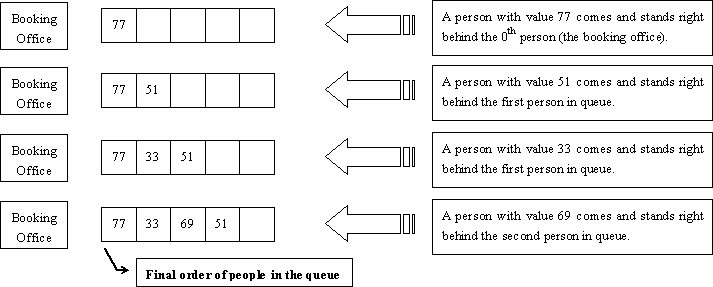Description
Railway tickets were difficult to buy around the Lunar New Year in China, so we must get up early and join a long queue…
The Lunar New Year was approaching, but unluckily the Little Cat still had schedules going here and there. Now, he had to travel by train to Mianyang, Sichuan Province for the winter camp selection of the national team of Olympiad in Informatics.
It was one o’clock a.m. and dark outside. Chill wind from the northwest did not scare off the people in the queue. The cold night gave the Little Cat a shiver. Why not find a problem to think about? That was none the less better than freezing to death!
People kept jumping the queue. Since it was too dark around, such moves would not be discovered even by the people adjacent to the queue-jumpers. “If every person in the queue is assigned an integral value and all the information about those who have jumped the queue and where they stand after queue-jumping is given, can I find out the final order of people in the queue?” Thought the Little Cat.
Input
There will be several test cases in the input. Each test case consists of N + 1 lines where N (1 ≤ N ≤ 200,000) is given in the first line of the test case. The next N lines contain the pairs of values Posi and Vali in the increasing order of i (1 ≤ i ≤ N). For each i, the ranges and meanings of Posi and Vali are as follows:
There no blank lines between test cases. Proceed to the end of input.
Output
For each test cases, output a single line of space-separated integers which are the values of people in the order they stand in the queue.
Sample Input
4 0 77 1 51 1 33 2 69 4 0 20523 1 19243 1 3890 0 31492
Sample Output
77 33 69 51 31492 20523 3890 19243
Hint
The figure below shows how the Little Cat found out the final order of people in the queue described in the first test case of the sample input.

题意有n个人,给出每个人每次插入的位置,和这个人的价值,输出最后的价值顺序,因为队伍是动态变化的所以可以从最后一次插入往前插入,cc[o]维护节点o所对应区间能插入的人数,插入时如果左边能插入就插在左边,否则插在右边,递归到叶节点为止。。。
/*************************************************************************
> File Name: f.cpp
> Author: acvcla
> QQ:
> Mail: acvcla@gmail.com
> Created Time: 2014年10月04日 星期六 22时39分16秒
************************************************************************/
#include<iostream>
#include<algorithm>
#include<cstdio>
#include<vector>
#include<cstring>
#include<map>
#include<queue>
#include<stack>
#include<string>
#include<cstdlib>
#include<ctime>
#include<set>
#include<math.h>
using namespace std;
typedef long long LL;
const int maxn = 2e5 + 10;
#define rep(i,a,b) for(int i=(a);i<=(b);i++)
#define pb push_back
int cc[maxn<<2],ans[maxn];
int loc[maxn],val[maxn];
void built(int o,int l,int r){
if(l==r){
cc[o]=1;
return;
}
int M=(l+r)>>1;
built(o<<1,l,M);
built(o<<1|1,M+1,r);
cc[o]=cc[o<<1]+cc[o<<1|1];
}
int x,w;
void Modify(int o,int l,int r)
{
cc[o]--;
if(l==r){
ans[l]=w;
return;
}
int M=(l+r)>>1;
if(cc[o<<1]>=x){
Modify(o<<1,l,M);
return ;
}
x-=cc[o<<1];
Modify(o<<1|1,M+1,r);
}
int main(){
int n;
while(~scanf("%d",&n)){
built(1,1,n);
rep(i,1,n){
scanf("%d%d",loc+i,val+i);
}for(int i=n;i>=1;i--){
x=loc[i]+1,w=val[i];
Modify(1,1,n);
}
printf("%d",ans[1]);
rep(i,2,n)printf(" %d",ans[i]);
printf("\n");
}
return 0;
}
原文地址:http://blog.csdn.net/acvcla/article/details/39784871